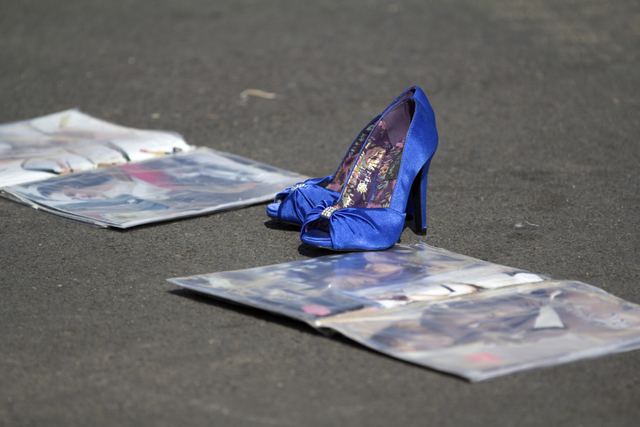Hookers’ treatment far worse than a dog
Dog lovers, bless their hearts, are a fierce and vocal bunch.
If some moron gets caught abusing a pitbull or locking a Shih Tzu in a parked car, the animal defenders rise and bark incessantly on behalf of their canine friends. They write hundreds of letters and emails expressing their outrage.
Should an abuse case happen to proceed to trial, the dog lovers are known to pack a courtroom. With a certain logic, they’ll remind you animals aren’t like people: A dog can’t defend itself the way a person can. If they don’t stand for fido, who will?
If only the Strip’s army of local street prostitutes received as much respect as some suffering pets. It would be refreshing to see a vocal segment of the community rise and shout its righteous indignation over the brutality inflicted on an endless lineup of young women battered and even murdered in the name of sex commerce in Las Vegas.
It hasn’t happened — at least, not yet.
Despite increased efforts to generate public support by members of law enforcement and the clergy, and no small amount of money spent to raise awareness of sex trafficking, the carnage continues apace.
The latest example of the brutality inherent in the business is the case of a prostitute under the control of alleged pimp Robert Sharpe III. The teen was tortured over a period of four months before being dumped near University Medical Center on June 30 with internal injuries, a spinal fracture, and the undeniable signs of torture. Sharpe, 28, was arrested Tuesday and charged with attempted murder, kidnapping, domestic battery, sex trafficking and a list of other felonies. Law enforcement sources say Sharpe is related to pimp Raymond C. Sharp, who was convicted of kidnapping and pandering in 2011 and sentenced to three life sentences.
Members of Metro’s Vice Unit regularly see the awful result of the violence associated with prostitution in Las Vegas, but the acts alleged in the Sharpe case are especially egregious.
“This case, in its entirety, is one of the worst we’ve seen,” Vice Lt. Karen Hughes says. “Young women lose their lives, and she was probably days away from dying. Although lots of our cases have that recurring theme, in this case the degree of torture and beatings made it one of the worst I’ve experienced.”
That’s saying a great deal.
In Las Vegas, the tales of torture and murder associated with the sex trade proliferate in the court files. A brief sample:
■ There’s Anthony Smith, who decided to discipline one of his girls with an aluminum bat. He swung the bat so hard the impact bent the metal.
■ There’s Marshall Greene, who used a belt to inflict internal injuries on Alicia Lee before finally asphyxiating her after three hours of torture.
■ There’s pimp Shaen Leflore, accused of shooting his reluctant employee, Chantell Hollowell, in the head and attempting to make it look like a suicide.
■ Then there’s Yung Park, whose escort business associates caved her head in with a wrench and lit her corpse on fire over a financial falling out.
Where’s the public outcry for the victims of this violence?
Part of the problem, Hughes says, is the fallacy that prostitutes control their own destiny when, in reality, they often are duped into the life out of a display of false affection. According to arresting documents, that was the case in the Sharpe investigation.
“People have become so desensitized to human-on-human violence, especially if they believe a person had a ‘choice’ in their own fate,” Hughes says. “Somehow, the victims in these horrendous crimes are always blamed for not making the right ‘choice,’ shifting the blame away from the offenders.”
Although the streets aren’t filled with vigils and outraged citizens, Hughes admits, a change has taken place inside the justice system. Thanks in part to tougher laws — especially AB67, the anti-sex trafficking statute — pimps are getting hit with bigger sentences. Where plea bargains were once common, prosecutors from the offices of District Attorney Steve Wolfson and U.S. Attorney Dan Bogden are taking cases to trial.
“When the jury hears the facts, to me, that’s the validation,” Hughes says. “Are they rallying in the streets? No. But do we have people that abhor the kind of criminal torture that these women go through? Absolutely.
“At least our criminal justice system has the punishment right in most cases now. … Maybe we will fill a courtroom one day.”
John L. Smith’s column appears Sunday, Tuesday, Wednesday, Friday and Saturday. Email him at Smith@reviewjournal.com or call 702-383-0295. Follow him on Twitter @jlnevadasmith.

















